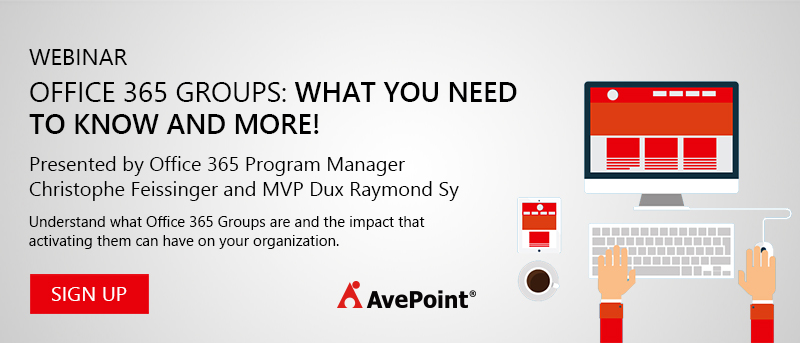2016 Year In Review: Microsoft’s Missions for Voices for Innovation and A Cloud for Global Good
Hi everbody! Welcome to another episode of Dux Quax. As we come closer to the end of 2016, it’s time to take a look back at some of the significant initiatives that Microsoft has made in impacting technology public policies and legislation through a program call Voices for Innovation.
Today I had the pleasure of speaking with Jonathan Friebert, Director of External Affairs at Microsoft. As a leader and key advocate for advancing Microsoft’s government affairs and technology public policies, Jonathan gives us some exclusive insight into Microsoft’s Voices For Innovation program – which engages Microsoft partners interested in public policies related to technology, Microsoft’s recently released book “A Cloud for Global Good” – policy roadmap for a trusted, responsible, and inclusive cloud, and what he sees in store for technology and legislation in 2017.
Take a look at the interview below, and as always, reach out to (@meetdux) and (@friebs) on Twitter with your thoughts and questions!
Learn More about Voices for Innovation:
Voices for Innovation (VFI) is a Microsoft supported community of technology professionals and everyday Americans who help advance technology, IT job growth, and businesses of all sizes. As empowered citizen advocates, we work together to shape public policies for our 21st century digital economy and society.
Check out the Voices for Innovation blog!
Learn More about Microsoft’s “A Cloud for a Global Good”:
This document has been designed as a roadmap to help policymakers take full advantage of the transformational benefits of the cloud. We offer a set of 78 recommendations in 15 policy categories that will provide the foundation for a regulatory environment that leads to a trusted, responsible, and inclusive cloud.
Check out more information, case studies, policy roadmaps, and download the full text by going to Microsoft’s “A Cloud for Global Good” resources.
More from Dux Quax: 2016 Year in Review from the Microsoft Team
- Microsoft’s James Phillips Recaps Microsoft’s Greatest Hits in 2016 with Business Applications like Dynamics 365
- Microsoft’s Adam Harmetz, Group Program Manager for SharePoint, Recaps 2016 and Talks SharePoint in 2017
- Microsoft’s Mark Kashman Recaps The Year 2016 and What’s Next for SharePoint in 2017
- Microsoft’s Kirsten Edmondson Wolfe Explains How Intelligent Cloud Took the Public Sector by Storm in 2016
- Microsoft’s Satish Thomas Shares Insight Into Microsoft AppSource and Talks Plans for 201

Transcript: Dux Quax with Jonathan Friebert on the Latest Efforts from Microsoft’s Voices For Innovation to Advance Technology Public Policies
Dux: Okay. Hi, everyone. Welcome to another episode of Dux Quax year-end review. This week, as I have mentioned to everybody, I’m in the headquarters, Microsoft Redmond, very excited today to be with Jonathan. So, Jonathan, why don’t you introduce yourself? Tell everybody what you do and why you’re excited about the work you do here in Microsoft.
Jonathan: Great. So my name is Jonathan Friebert and I am in Microsoft U.S. Government Affairs based here in Redmond. I manage a program called Voices For Innovation. Voices For Innovation is an amazing community where we work with Microsoft partners and really anybody who’s interested in technology public policy issues that impact your companies, your customers, consumers as a whole.
Dux: So tell me about working with partners in the public and public policies. So can you give some examples of some of the recent work and why it’s very important for not only as partners of Microsoft but for everybody in general?
Jonathan: Sure. So when I think about technology, public policy, and, really, just some of the issues and challenges with technology, I think about it in two ways. There’s the technical solution, really, that a lot of our partners are working on, and then there’s the regulatory and public policy solution and issue that really, I think, we, as a collective, need to work on together to educate elected officials and talk about what’s going on with your customers or in the industry.
So for example, there’s been two issues that we’ve been really focused on for 2016 and I think I’ve made some inroads on. The first has to do with Cloud privacy. So a number of our laws dealing with Cloud privacy haven’t been updated in the past 30 years and there’s one law in particular, the Electronic Communications Privacy Act that was last updated in 1986. So there’s been some work to try to modernize that law and try to modernize a number of these outdated laws when it comes to digital privacy and dealing with the fact that there’s a lot of cross-border issues that you need to think about.
So when it comes to your customers, I am sure, you know, from what I hear from partners, they’re getting a lot of questions about privacy or about security. And so, really, like I said, you know, there’s the technical side and then there’s the regulatory legislative side. You need to be working in both areas, I think, to really capture and deal with this problem.
Dux: I mean, you hit the nail on the head, right? So speaking of our customers, especially, large global customers, one of the top of mind these days is around security, data governance, compliance, and Microsoft has done a great job with setting up data centers around the world because data sovereignty is a key consideration with a lot of these customers and governments for that matter. So I think that alone is a huge topic and that alone not only impacts the U.S. but the rest of the world.

Jonathan: Absolutely, absolutely. I think there’s another challenge, too, and that has to do with some of the workforce issues. So one of the things that we’ve been focused on with the VFI community here in the U.S. is trying to make computer science count towards a math or science degree when you graduate from high school.
So when we started on this about two or three years ago, there was less than 10 states that counted computer science. Now, there’s over half and we’re hoping in this 2017 to actually bring the rest of the states on board. There’s about 12 or 13 states left that we’re trying to get with the count computer science education. So that’s, again, something that needs to be done legislatively.
So, you know, as I think about it, you know, there are workforce issues when you think about the skills that we need for our economy and the skills that people need to participate in the economy going forward, and computer science and STEM, I would say, are two skillsets that are gonna be necessary for our future economy.
Dux: And that’s quite surprising. You would think, in this day and age, and with technologies proliferating all over the place, STEM, computer science, you would assume that’s top of everybody’s mind. But you’re right. Unless we bring awareness and unless people know about this, it’s organizations like VFI is very critical to bring it into forefront.
Jonathan: Yeah, I agree with you. I think it’s critical for anybody in the technology industry to be having dialogues with their elected officials or decision-makers in government. It doesn’t have to be about, you know, these specific topics, but I think it’s important, frankly, that people get to know their elected officials. They’re there to serve them.
Dux: Right.
Jonathan: You know, you’re the constituent or the customer of your elected officials. They’re supposed to work for you. And oftentimes, when we have these dialogues with elected officials, they’re not aware. They don’t know about these challenges. And so I think it’s incumbent upon us in the technology industry to help educate them, and that’s what we try to do with VFI.
Dux: That’s a great analogy, right, because if we think about our customers, oftentimes, as technologists, we work with IT people. And then IT people always tell us our executive stakeholders don’t get it. But then you have to think about from their perspective, they just don’t know. So it’s incumbent upon us to educate, make them aware, and talk about the good, the bad, ugly, and implications of if we do this or not. But speaking of education and awareness, one of the most exciting initiative Microsoft launched recently is “Cloud for Global Good.” Can you tell everybody what that’s about and why it’s important?
Jonathan: Sure. So this is the book, “A Cloud for Global Good,” that we recently launched. And really, what this is, it’s a policy road map for a trusted, responsible, and inclusive cloud. So what we were just talking about, kind of those themes, resonate in this book. You don’t have to read the whole book. A lot of this is online. There are some great and really interesting case studies there. But really, what Microsoft is trying to do, working with our partners but also working with policy leaders, is to establish a footprint and to say, you know, “When we think about the cloud, we understand that it needs to be both trusted and responsible, but also inclusive.”
We understand that as, you know, the economy shifts and we talk about this fourth industrial revolution, you know, more on the technology side of things, AI, machine learning, you know, those are challenges that we need to address together in society, have public policy frameworks around those, but also just to understand. I think that’s what we’re trying to demonstrate with Microsoft. We understand what the shift means and our responsibility in making sure that everyone can come along as the technology and the economy moves forward.
Dux: That’s very impressive and exciting, and I’m sure this is a work that’s in constant motion, so it’s not a onetime thing. As technology evolves, as the world, the landscape the world change, this is far more important now than ever before.
Jonathan: Absolutely.
Dux: Now, if people are interested to check it out, learn more about it, is there a website for “A Cloud for Global Good?”

Jonathan: Yes, there is a website. So if you Bing “A Cloud for Global Good,” we do have collateral on a Microsoft website and I can provide that.
Dux: Awesome, awesome.
Jonathan: I can provide that to you.
Dux: And also, the “Fourth industrial Revolution,” so those of who may not have heard about it or read about it, Bing that, too, “Fourth Industrial Revolution.” Microsoft has done a lot of great inroads and conversation and proved points on why this revolution is real.
Jonathan: Right, right. And it’s not just Microsoft talking about it. I mean, there are global institutions that are talking about this fourth industrial revolution and what this shift means. And so, again, this book, this framework is about trying to have a conversation with policy-makers and our partners and customers about what it means.
Dux: Absolutely. So it looks like you had a busy 2016.
Jonathan: Yes, we had a busy 2016 and we’re gonna have a busy 2017 as well.
Dux: All right, tell us about 2017. What’s in store for VFI, and why are you excited about it?
Jonathan: Sure. So first of all, as I always tell my colleagues in government affairs, “I have the best job in government,” because I get to work with our small business partners, large business partners, but really, the real people that are driving this economy forward and driving, frankly, Microsoft forward. So I really enjoy what I’m doing.
I think for 2017, you know, we’re gonna have a new president. We’re gonna have a new congress. We’re gonna have new governors, new state legislators. So I think it’s continuing to build upon the momentum, continuing to have those dialogues with the elected officials, in particular, new elected officials about what’s going on in the technology sector, why this matters.
And again, I think privacy, security, and computer science education, computer science for all, these are all the important things that are going to be on, I would say, the VFI policy docket going into 2017. I wanna make sure that we get some federal funding, I think, for computer science education. I think we wanna, again, update our outdated laws and I think it’s important that congress take some action on that regard as well.
Dux: Wonderful, so if folks are interested to learn more about VFI, even participate, because I get your newsletters at the very least for every week and it’s very insightful and educational, where can people go?
Jonathan: Sure. So two things that you can do, one, I encourage you to sign up for Voices For Innovation online. It’s free, free to join, free to participate in. The website is www.voicesforinnovation.org. You can also feel free to email me, reference you saw this video. And my email is J-F-R-I-E-B, jfrieb@microsoft.com.
Dux: Awesome. Well, this has been very insightful, Jonathan. But before I let you go, if you were a Microsoft product, what would you be and why?
Jonathan: Well, I think I would be Sway.
Dux: Sway?
Jonathan: Sway, and the reason I would be Sway is I think storytelling is such a powerful way to communicate your ideas, your thoughts. And so I really think Sway is a dynamic product that uses, you know, that utilizes just multi-ways that you can share your story. So, you know, I feel like I’m in the storytelling business, in the communication business, and I am a big fan of Sway, so that is what I would be.
Dux: Awesome. I thought it had something to do with dancing.
Jonathan: Hah, I wish. I’m not a great dancer.
Dux: But, Jonathan, thank you.
Jonathan: Thank you.
Dux: Appreciate it. And, guys, thanks again for watching. Till the next episode, have a great time. Bye.
Jonathan: Bye.







